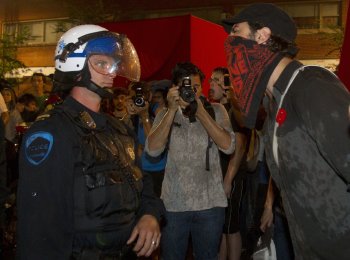On the first full day of the Quebec election campaign, university tuition hikes have become the central issue.
On Wednesday morning, Premier Jean Charest did the expected by pulling the plug on his Liberal government and sending Quebecers to the polls for a September 4 election.
By that evening, thousands of students took to Montreal's streets in a continuation of protests over the Liberal government's planned tuition fee hikes. According to The Canadian Press, there were 15 arrests and some minor damage to property.
And, on Thursday, Parti Quebecois leader Pauline Marois did what most expected of her — she promised to drop the tuition hikes, cancel the emergency protest law Bill 78 and call for a summit on university funding within 100 days of being elected.
While the campaign promise will undoubtedly garner the support of protesting students, at least one political scientist isn't convinced it will translate into votes.
"Students don't vote," Concordia university professor Bruce Hicks told Yahoo! Canada News.
"Voting turnout has been declining with each generation and young people around the world have been opting out of the political process."
Hicks suggests, however, that the protests will somehow have impact on the election.
"If the student protests result in property damage or anger the population, public opinion could shift in support of Premier Charest. He needs a boost of about 10 percentage points from where he is now to win a majority of seats in the National Assembly," he said.
"If the student protests do not alienate the majority of Quebecers then it continues to become a reminder of a general dissatisfaction with the government and the status-quo. By keeping the unrest front and centre of voters' minds helps the opposition parties."
Hicks adds that striking students are scheduled to return to class to finish their suspended term in mid-August. Coincidentally, that's when the provisions banning student protests on or near universities kicks in.
"This has the potential to escalate the conflict — and that is during the last weeks of the campaign," Hicks says.
"So absent the usual factors that determine elections, such a policies, personalities, campaign gaffes, organization, issues and leaders' debates, the students are the wild card in this election."
One way or another, it seems the students of Quebec will determine Jean Charest's future.
Original Article
Source: ca.news.yahoo
Author: Andy Radia
On Wednesday morning, Premier Jean Charest did the expected by pulling the plug on his Liberal government and sending Quebecers to the polls for a September 4 election.
By that evening, thousands of students took to Montreal's streets in a continuation of protests over the Liberal government's planned tuition fee hikes. According to The Canadian Press, there were 15 arrests and some minor damage to property.
And, on Thursday, Parti Quebecois leader Pauline Marois did what most expected of her — she promised to drop the tuition hikes, cancel the emergency protest law Bill 78 and call for a summit on university funding within 100 days of being elected.
While the campaign promise will undoubtedly garner the support of protesting students, at least one political scientist isn't convinced it will translate into votes.
"Students don't vote," Concordia university professor Bruce Hicks told Yahoo! Canada News.
"Voting turnout has been declining with each generation and young people around the world have been opting out of the political process."
Hicks suggests, however, that the protests will somehow have impact on the election.
"If the student protests result in property damage or anger the population, public opinion could shift in support of Premier Charest. He needs a boost of about 10 percentage points from where he is now to win a majority of seats in the National Assembly," he said.
"If the student protests do not alienate the majority of Quebecers then it continues to become a reminder of a general dissatisfaction with the government and the status-quo. By keeping the unrest front and centre of voters' minds helps the opposition parties."
Hicks adds that striking students are scheduled to return to class to finish their suspended term in mid-August. Coincidentally, that's when the provisions banning student protests on or near universities kicks in.
"This has the potential to escalate the conflict — and that is during the last weeks of the campaign," Hicks says.
"So absent the usual factors that determine elections, such a policies, personalities, campaign gaffes, organization, issues and leaders' debates, the students are the wild card in this election."
One way or another, it seems the students of Quebec will determine Jean Charest's future.
Original Article
Source: ca.news.yahoo
Author: Andy Radia

No comments:
Post a Comment